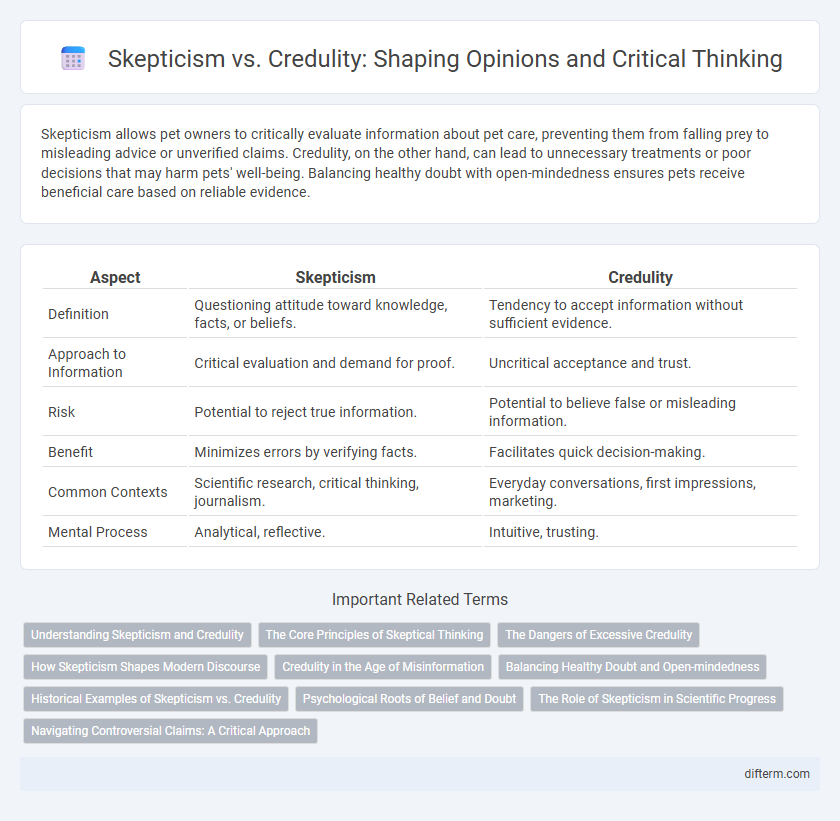Skepticism allows pet owners to critically evaluate information about pet care, preventing them from falling prey to misleading advice or unverified claims. Credulity, on the other hand, can lead to unnecessary treatments or poor decisions that may harm pets' well-being. Balancing healthy doubt with open-mindedness ensures pets receive beneficial care based on reliable evidence.
Table of Comparison
| Aspect | Skepticism | Credulity |
|---|---|---|
| Definition | Questioning attitude toward knowledge, facts, or beliefs. | Tendency to accept information without sufficient evidence. |
| Approach to Information | Critical evaluation and demand for proof. | Uncritical acceptance and trust. |
| Risk | Potential to reject true information. | Potential to believe false or misleading information. |
| Benefit | Minimizes errors by verifying facts. | Facilitates quick decision-making. |
| Common Contexts | Scientific research, critical thinking, journalism. | Everyday conversations, first impressions, marketing. |
| Mental Process | Analytical, reflective. | Intuitive, trusting. |
Understanding Skepticism and Credulity
Understanding skepticism involves recognizing its foundation in critical thinking and the demand for evidence before accepting claims as true. Credulity, by contrast, reflects a tendency to believe information readily without sufficient scrutiny, often leading to misinformation or false conclusions. Balancing skepticism and credulity is essential for forming well-informed opinions and navigating complex information landscapes effectively.
The Core Principles of Skeptical Thinking
Skeptical thinking demands the rigorous evaluation of evidence and the suspension of judgment until sufficient proof is obtained, emphasizing critical inquiry over acceptance. It prioritizes intellectual humility, recognizing cognitive biases and the limitations of one's knowledge while encouraging continuous questioning. This approach fosters informed decisions, preventing the pitfalls of credulity and unwarranted belief.
The Dangers of Excessive Credulity
Excessive credulity undermines critical thinking and makes individuals vulnerable to misinformation, scams, and manipulation by unreliable sources. Blind trust in unverified claims can lead to poor decision-making in personal, social, and political contexts, exacerbating societal divisions and spreading false narratives. Developing healthy skepticism is essential for evaluating evidence objectively and safeguarding intellectual autonomy.
How Skepticism Shapes Modern Discourse
Skepticism shapes modern discourse by promoting critical analysis and evidence-based reasoning, which combats misinformation and superficial claims. It encourages individuals to question assumptions and seek verifiable facts, fostering intellectual rigor in public conversations. This disciplined doubt ultimately strengthens decision-making processes and democratic engagement.
Credulity in the Age of Misinformation
Credulity in the age of misinformation fosters the unchecked spread of falsehoods, eroding public trust in genuine sources. Social media platforms amplify sensational content, making it increasingly difficult for individuals to discern fact from fiction. A critical approach to information consumption is essential to combat the pervasive influence of deceptive narratives.
Balancing Healthy Doubt and Open-mindedness
Balancing healthy doubt and open-mindedness requires discerning evaluation of evidence without dismissing new ideas outright. Skepticism sharpens critical thinking, preventing gullibility, while credulity fosters adaptability in the face of novel information. Striking this equilibrium enhances informed decision-making and intellectual growth.
Historical Examples of Skepticism vs. Credulity
Historical examples reveal the tension between skepticism and credulity, such as the Salem witch trials where mass credulity led to tragic convictions based on dubious evidence. In contrast, the scientific revolution exemplified skepticism, with figures like Galileo challenging prevailing dogmas through empirical observation and critical inquiry. These cases underscore the importance of balancing doubt and belief to advance knowledge and justice.
Psychological Roots of Belief and Doubt
Psychological roots of belief and doubt lie in cognitive biases, emotional needs, and social influences, shaping how individuals balance skepticism and credulity. Confirmation bias reinforces existing beliefs, while doubt often emerges from critical thinking and the evaluation of evidence. Understanding these psychological mechanisms is essential for cultivating informed opinions and resisting misinformation.
The Role of Skepticism in Scientific Progress
Skepticism serves as a foundational pillar in scientific progress by fostering critical examination of hypotheses and preventing the acceptance of unverified claims. Scientific advancements rely on rigorous testing and replicable evidence, which skepticism inherently demands to validate new theories. This cautious approach balances against credulity, ensuring that knowledge evolves based on empirical data rather than unfounded belief.
Navigating Controversial Claims: A Critical Approach
Navigating controversial claims requires balancing skepticism and credulity by rigorously evaluating evidence and source credibility. Critical thinking skills enhance the ability to discern factual information from misinformation, fostering informed decision-making. Emphasizing empirical data and peer-reviewed research helps reduce bias and prevent the acceptance of unfounded assertions.
skepticism vs credulity Infographic

 difterm.com
difterm.com